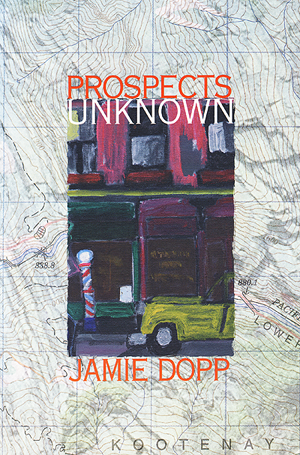Novel Description
Prospects Unknown: A Mystery With a Difference. Victoria, BC: Ekstasis Editions. 321 pages.
In the mining town of Silver, British Columbia, two Latin American refugees have been murdered during a bitter strike at the Cyclops silver mine. Were they scabs killed by union radicals or undercover organizers killed by the owners of the mine? And what about the rumours of a hit squad from their home country of Costaguana?
The bodies are found by Phil Tucker, a young man fleeing Vancouver and a love affair gone bad. The RCMP have sent in one of their best investigators, Inspector Charles Gould. Tucker, looking for distraction, tries to parlay his discovery into become a sidekick to Gould during the investigation.
Shortly after Gould arrives with his team of investigators, the case takes a shocking turn, and Gould's renowned self-confidence is shattered. Trapped between carrying on in a compromised position and resigning from the Force, Gould decides to carry on, with one important difference: he gives in to the overtures of Phil Tucker. Soon the outcome of the case is deeply intertwined with the complex and amusing relationship between Tucker and Gould.
What critics have said about Prospects Unknown
Dopp bends the rules here, as does RCMP Inspector Charles Gould, attempting to bring genuine psychological depth to the often mechanical cop procedural sub-genre . . . . Using Tucker as Narrator is risky . . . [but] Dopp carries it off much in the way Fowles did, by creating a tale of dual searches for truth--Gould's investigation and Tucker's notebooks--amid a multiplicity of lies and hidden agendas . . . . A final Fowles-like twist forces us to reconsider the whole story, leaving a question, liberating or perplexing, instead of a smug catharsis.
-John Moore in Sub-Terrain
Excerpt from Prospects Unknown
Gould covered the last few feet with his usual unhurried but unhesitating stride, eyes slightly narrowed, lips a near perfect straight line, almost invisible below the cropped moustache. When he stopped the grey flannel of his trousers just brushed the faux-marble edge of the table.
"May I?"
I closed my journal . . . .
Gould was dressed in his trench coat and flagrantly I-am-a-plain-clothes-cop blue blazer. There was something Big Bird-like about him, the hockey player not the costume character: the high neck, the angular chin and nose, the red-topped height. I remembered the hockey player, Larry Robinson, from watching the Montreal Canadiens as a kid. Robinson was famous for devastating body checks that looked entirely unspectacular, just a meeting of shoulder against chest, a muffled umph, and the opposing player flat on his back with the wind knocked out of him.
Gould, when Betty approached, said, "Coffee. And do you have any apple pie tonight?"
"Heated?"
"But no ice-cream. Thank you."
I kept my eye on him. My cheeks felt hot. I had a searing memory of our meeting just three days before. I will charge you with obstructing justice . . . . After he ordered his pie, Gould seemed to forget me entirely for a while. He made himself comfortable (if that school-master posture could ever be comfortable) and focused his eyes elsewhere, waiting.
After Betty came and went again, Gould took a bite of pie. He raised his cup to his lips. He seemed to savour the coffee, holding it in his mouth before slowly swallowing, and then, all at once, gestured with his fork.
"Is that it?"
He was pointing to my journal.
"Is that the famous book?"
"Not exactly famous."
"Still interested in passing on what you've learned?"
"I-"
"Why don't you read to me? Read me some of those accounts that might be pertinent to the Soledad investigation."
I tried to decode his expression, but, as you'd expect, I had no luck. There was irony in the way he spoke, a hint that I was being mocked in some way, but I couldn't be sure to what extent or for what reason. It was quite possible that the request was a ruse, a delaying tactic, a way of drawing out my discomfort (I still expected him to blow up at me at any time). On the other hand, I couldn't think of anything else to do.
So I raised the journal to my chest in two hands. Opened it below my chin, like a prayer book. "Where should I start?"
Gould raised a corner of his mouth, a half-grin.
"At the beginning, of course."

